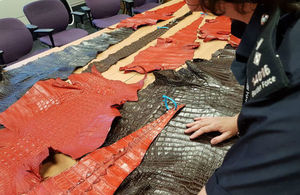Thousands of Border Force seizures in international operation against wildlife crime
Border Force has seized thousands of products containing endangered plant and animal species as part of an international operation targeting wildlife criminals.

Thousands of Border Force seizures in international operation against wildlife crime article
During the month long global Operation Thunderball, Border Force officers in the UK made 168 seizures containing thousands of products regulated under CITES (the Convention on International Trade in Endangered Species) at ports and airports.
The international operation was co-led by the World Customs Organisation (WCO) and INTERPOL and involved police, customs, environment, wildlife and forestry agencies from 111 countries. The ultimate aim was to focus enforcement activities on criminal groups, leading to the disruption of organised wildlife trafficking.
Samantha Trackman, from Border Force’s CITES enforcement team based at Heathrow Airport, said:
Border Force officers have taken thousands of products out of circulation as part of Operation Thunderball.
Wildlife crime has a devastating environmental impact and by joining forces internationally in operations such as this, we ensure that our efforts to tackle it are getting maximum results.
Worldwide, Operation Thunderball ran from 4 to 30 June, leading to seizures of 23 live primates; 30 big cats; more than 4,300 birds; just under 1,500 reptiles and nearly 10,000 turtles and tortoises. There were also seizures of ivory, rhino horns, game meat and timber. Initial results led to the identification of almost 600 suspects, triggering arrests worldwide.
Border Force officers at ports and airports across the country intensified their enforcement activity to coincide with the international operation. UK seizures included:
- 4 ivory seizures including binoculars, silverware and cutlery
- more than 100 live orchid plants and 6 live cactus plants
- nearly 5000 cactus extract tablets (including coffee / tea sachets and dietary supplements)
- 900 tablets containing hoodia (a cactus-like succulent plant) marketed as weight loss aids
- 4 products derived from crocodile plus 10 tanned skins
- 2 bear skulls and skins
- snakeskin products and boots
- 750kg of products containing Aloe andongensis marketed as beard grooming kits
- rosewood ladders and guitars
Samantha Trackman added:
As well as animal products, we have also seized many plant species this year including whole plants such as varieties of orchid and cactus. Other seizures included a large number of pills and dietary supplements which claim to help with everything from detoxing and losing weight to curing impotency – all of which contained extracts from endangered plant species.
We work closely with law enforcement partners such as the National Wildlife Crime Unit which enables intelligence from frontline seizures to be quickly shared, with the ultimate aim of targeting the networks behind global wildlife crime.
Border Force is responsible for frontline detection and seizure of items covered by the CITES convention, which tackles the illegal trade in endangered animals and plants. The Heathrow-based Border Force CITES team are specialist officers who are recognised as world leaders in their field.
Anyone with information about smuggling or trafficking should contact Crimestoppers on 0800 555 111 anonymously or visit http://www.crimestoppers-uk.org